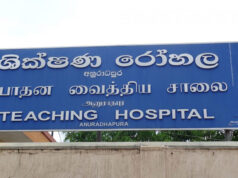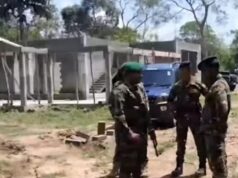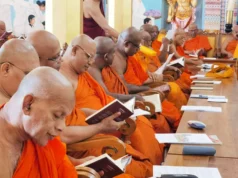ECONOMYNEXT —Tamil National Alliance (TNA) will engage constructively in sincere attempts at resolving the ethnic issue, legislator M A Sumanthiran said responding to President Ranil Wickremesinghe’s overtures to the opposition, while also suggesting that the TNA was open to a federal solution.
“We will engage constructively in every sincere attempt as we have always done but will not allow any farcical process,” Sumanthiran tweeted Thursday November 24 afternoon.In a speech made in parliament the previous day, the Jaffna district MP said there can be no reconciliation by sweeping the truth under the carpet.
“It is only by the ascertainment of the truth that there can be true reconciliation,” he said.
“Your actions must be louder than words. All we have are words, words and words. As I speak, more lands are being acquired,” he added, highlighting an example that prompted a response from President Wickremesinghe that he would look into the matter.
Wickremesinghe on Wednesday re-extended an open invitation to opposition parties to a discussion on a permanent solution to Sri Lanka’s decades-long ethnic problem. Talks would begin after December 11, he said, with a view to agreeing on a solution by February 04 2023 when the island nation celebrates 75 years of independence from the British.
“We welcome the president’s initiative. He said everyone must agree on the solution. We want all the people of this country to be content and be satisfied and feel secure that this is their country,” said Sumanthiran.The MP said there is broad consensus already on the issue and that only a few things need to be ironed out.
“That can be done in a day’s sitting. You don’t require three months,” he said.
President Wickremesinghe agreed in his speech that there is nothing new left to talk about.If the president is looking at the South African example, said Sumanthiran, it must be noted that that country underwent a political transformation “before they could look at accountability issues”.
“That fundamental change must happen and must precede other measures,” he said.
Among the issues that Sri Lanka is confronted with with regard to reconciliation between communities is the matter of alleged human rights abuses, particularly during the final phase of the 26-year armed conflict. Missing persons, militarisation and alleged land grabs have also figured prominently in various international fora where Sri Lanka’s human rights record has come up for discussion.
“Of course you need to do many confidence-building exercises because there is a serious lack of trust because of the long history and what happened,” said Sumanthiran.
The MP said it is crucial that the core, root issues are settled first before considering issues of justice and accountability, which he said would provide the people a different outlook on resolving those issues.He also paid what has lately been a rare compliment to President Wickremesinghe from the TNA.
“We recognise that perhaps you are the only person in this House today — although you’re not a member of this house — who’s had the longest experience in this matter. You were part of the government negotiation team that negotiated with the TULF from the middle to the end of 1986, which ended with the Indo-Lanka accord, and the 13th amendment which we did not accept as a meaningful scheme of devolution,” he said.
The 13th amendment to Sri Lanka’s constitution emerged out of the controversial Indo-Lanka Accord of 1987 as a purported solution to the worsening ethnic conflict. Provincial councils came in the wake of this amendment, but land and police powers have yet to be devolved to the provinces as originally envisioned. Both Sinhalese and Tamil nationalists have opposed the 13th amendment, the former claiming it devolved too much, the latter complaining it didn’t devolve enough.
Wickremesinghe knows “everything that is to know about the resolution of this”, said Sumanthiran. He also acknowledged the All Party Representative Committee (APRC) appointed by former President Mahinda Rajapaksa.
“Though we did not participate in the APRC, that’s a good report. Many members in the front row today in the government were members of the cabinet in August 2000 when President Chandrika Bandaranaike Kumaratunga brought a constitution bill to parliament. The UNP at that time led by President Wickremesinghe opposed it only because of a transitional provision with regard to executive presidency, not because of the devolution arrangements in that,” he said.
The UNP government notoriously burnt the draft bill in parliament when the Kumaratunga government presented it. Analysts have revisited that event as a possible misstep in Sri Lanka’s path to a lasting peace, though others disagree.Sumanthiran said consensus is already there and all that is required is for decisions to be made.
“That is what has been entrusted to the president now,” he said.
The president’s call for a permanent resolution by the 75th Independence Day celebrations is a good ideal to work towards, but there isn’t much time, the MP warned.
“So we are willing to work with you constructively to achieve the objective you have enunciated. We’re willing to achieve the reasonable and legitimate aspirations of our people and indeed all the people that live in this country,” he said.In his speech, Sumanthiran was emphatic that his party does not wish to do anything behind the back of the majority.
“Everyone must feel secure. That is our desire as well. That the majority of this country must accept it.”
The MP then said that more than 40 percent of the world’s population live in federal countries. (There are 25 countries with a federal form of government).
“Those are the strongest countries in the world,” the MP claimed.
“You have others who are quasi federal, who sometimes call themselves unitary, like Great Britain, where the extent of devolution is far more than even in a federal form of government.
“We don’t ask for something that is not found anywhere in the world. We’re asking for something that is reasonable and is practised all around the globe. That will ensure that all our people will live with dignity and self respect in this country. We want the majority people to accept and understand that. You are, after all, a preponderant majority. No one can shift that. It was Prime Minister S W R D Bandaranaike who in 1926 introduced the idea of federalism to this country, not the Tamil leaders,” he said.Sumanthiran recalled that it was in fact the Kandyan chiefs who had asked for a federal form of government on two separate occasions in the early 20th century.
“So it can’t be bad for the Sinhala people, it was the Sinhala people who asked for it,” he said, noting that over time wrong messages have been communicated to the country.
“There are suspicions those must be allayed. We must resolve this in a just way, so that we can all can then stand up as the president envisages by Feb 04 2023 as the children of one mother,” Sumanthiran said.
Federalism has been a highly controversial and politically inflammable idea in Sri Lanka over the years, with many nationalist or even some moderate parties in the south vehemently opposing the very suggestion of it. It is unclear whether this stance has softened over the 13 years since the end of the war, but to date no Sinhalese-dominated party has come out in support for it.
Sri Lanka Podujana Peramuna (SLPP) MP Gevindu Kumaratunga who now sits in the opposition responding to Wickremesinghe’s invitation on Wednesday cautioned that they can only support a proposal that will honour Sri Lanka’s unitary character.
“If you’re asking for a consensus within a unitary Sri Lanka, we’ll agree. Outside of that, I don’t think a majority of people will agree. There is a ground reality here. Our soldiers laid down their lives to protect the unitary state,” said Kumaratunga.







